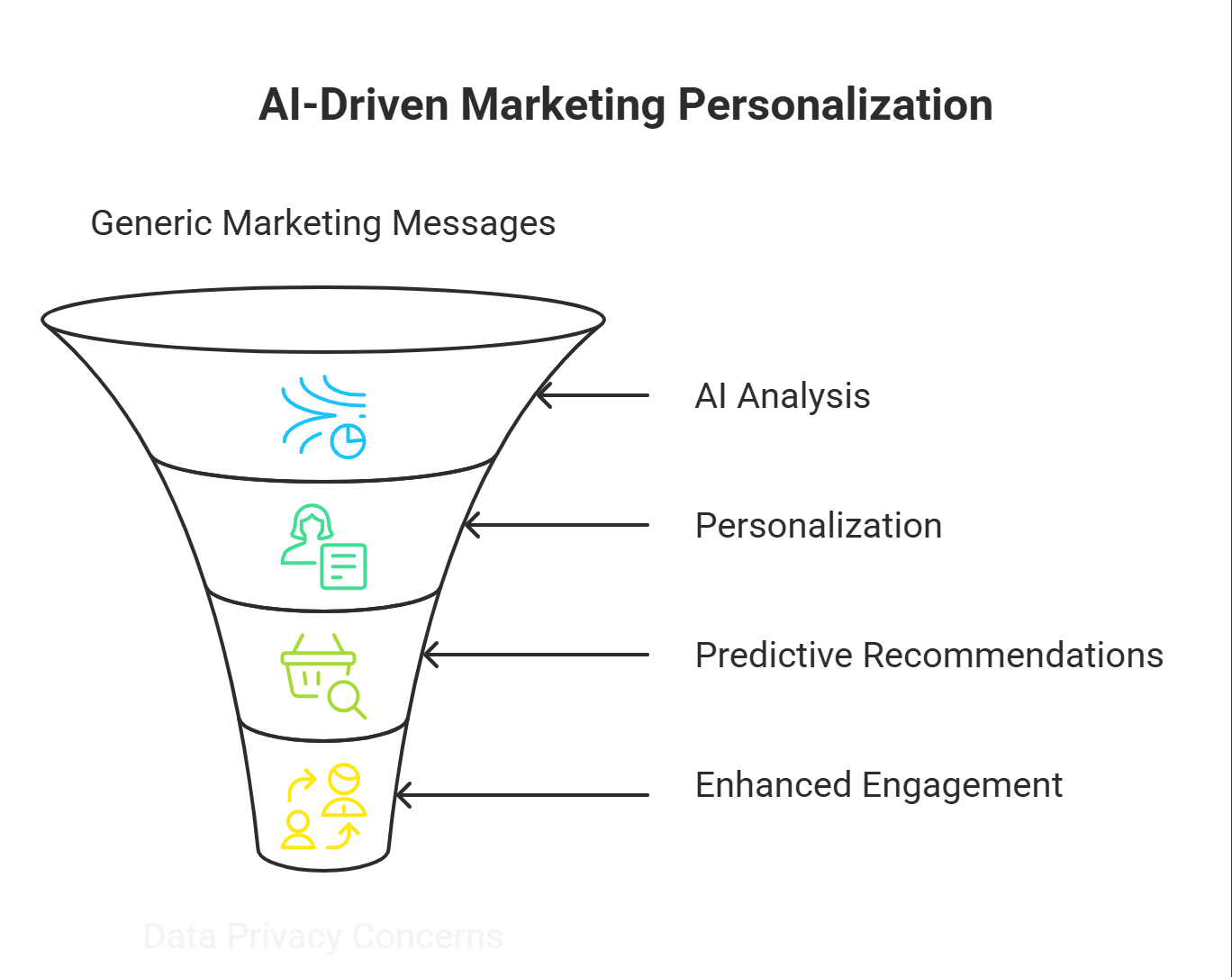Is your marketing falling flat? In an age of digital noise, generic messages are no longer just ignored; they’re a liability. Enter Artificial Intelligence, the game-changing force revolutionizing how brands connect with consumers. AI-driven marketing is no longer a futuristic concept—it’s the engine behind the hyper-personalized experiences that are setting leading brands apart. But as we embrace this new era of tailored content and predictive recommendations, we find ourselves on a precarious tightrope, balancing the undeniable benefits of personalization with the critical need for data privacy.
This article delves into the transformative power of AI in personalized marketing. We will explore how these intelligent systems are creating unprecedented opportunities for customer engagement and business growth. More importantly, we’ll navigate the crucial conversation around the “personalization-privacy paradox,” offering insights into the ethical practices that are paramount for building lasting customer trust in this AI-powered world.

The Engine of Modern Marketing: How AI Crafts Hyper-Personalized Customer Journeys
At its core, AI-powered personalization is the ability to understand and anticipate the needs of each individual customer. It’s about moving beyond broad demographics and creating a one-to-one dialogue. This is achieved through the sophisticated analysis of vast amounts of customer data. From Browse history and purchase patterns to social media interactions and even the time of day a customer is most active, AI algorithms identify patterns that would be impossible for a human to discern.
The technologies powering this revolution are multifaceted. Machine learning algorithms continuously refine their understanding of customer preferences with every interaction. Natural Language Processing (NLP) allows AI to understand and respond to customer inquiries and feedback in a human-like manner, powering advanced chatbots and sentiment analysis. Predictive analytics, fueled by this data, enables brands to anticipate future customer behavior, from predicting churn to recommending the next likely purchase.
The result is a seamless and highly relevant customer journey. Think of the product recommendations on Amazon that feel uncannily accurate, or the personalized playlists on Spotify that introduce you to your new favorite artist. These are not happy accidents; they are the product of sophisticated AI at work. This level of personalization extends to dynamic email campaigns where the content changes based on individual user behavior, and website experiences that adapt to show the most relevant information to each visitor.
The Triple Crown of AI Marketing: Boosting ROI, Engagement, and Customer Loyalty
The allure of AI in marketing extends far beyond creating “cool” experiences. The tangible business benefits are substantial and directly impact the bottom line. For marketers, the return on investment (ROI) is significantly enhanced. By delivering hyper-targeted messages, ad spend is optimized, and conversion rates see a marked increase. The days of “spray and pray” marketing are numbered.
This targeted approach naturally leads to enhanced customer engagement. When customers feel that a brand understands their needs and preferences, they are more likely to interact with its content, products, and services. This creates a virtuous cycle: the more a customer engages, the more data the AI has to further refine its personalization efforts, leading to even more relevant and engaging experiences.
Ultimately, this fosters a deeper sense of brand loyalty and significantly improves Customer Lifetime Value (CLV). By consistently providing value and demonstrating a genuine understanding of the individual, brands can transform one-time buyers into lifelong advocates. Real-world examples abound. Coca-Cola’s “Share a Coke” campaign utilized data to personalize bottles with popular names, leading to a significant boost in sales and social media engagement. Netflix’s recommendation engine is famously responsible for a substantial portion of the content watched on its platform, a testament to the power of AI in retaining customers. Similarly, Starbucks leverages AI to personalize email offers and rewards, driving repeat business and strengthening customer relationships.
The Ethical Tightrope: Navigating the Personalization-Privacy Paradox
For all its power, the rise of AI in marketing is not without its challenges. The very data that fuels personalization is also at the heart of a growing public concern: the personalization-privacy paradox. Consumers increasingly expect and appreciate tailored experiences, yet they are also more aware and wary of how their personal data is being collected, used, and protected.
This paradox presents a critical ethical tightrope for marketers to walk. The “creepy” factor is a real concern; when personalization crosses the line from helpful to intrusive, it can irrevocably damage customer trust. The key to navigating this challenge lies in a commitment to ethical AI practices.
Transparency is paramount. Brands must be open and honest with their customers about what data they are collecting and how it is being used to enhance their experience. This includes providing clear and accessible privacy policies and giving users meaningful control over their data.
Robust data security is non-negotiable. In an era of frequent data breaches, ensuring that customer information is protected is a fundamental responsibility. This builds confidence and demonstrates a genuine commitment to customer welfare.
Furthermore, marketers must be vigilant against algorithmic bias. AI systems are trained on data, and if that data reflects existing societal biases, the AI will perpetuate and even amplify them. Ensuring fairness and inclusivity in AI-driven marketing is not just an ethical imperative but also a business necessity for reaching a diverse customer base.
Regulatory frameworks like the General Data Protection Regulation (GDPR) in Europe provide a legal foundation for many of these ethical practices, but true leadership in this space requires a proactive and principled approach that goes beyond mere compliance.
In conclusion, the integration of Artificial Intelligence into personalized marketing is a paradigm shift that offers unprecedented opportunities for businesses to connect with their customers on a deeper, more meaningful level. The benefits, from increased ROI to enhanced customer loyalty, are undeniable. However, the power of this technology comes with a profound responsibility. The future of successful marketing will be defined not just by the sophistication of its personalization but by its commitment to ethical data stewardship. By embracing transparency, prioritizing privacy, and ensuring fairness, brands can harness the full potential of AI to build not just smarter marketing campaigns, but also more trusting and enduring relationships with their customers.


